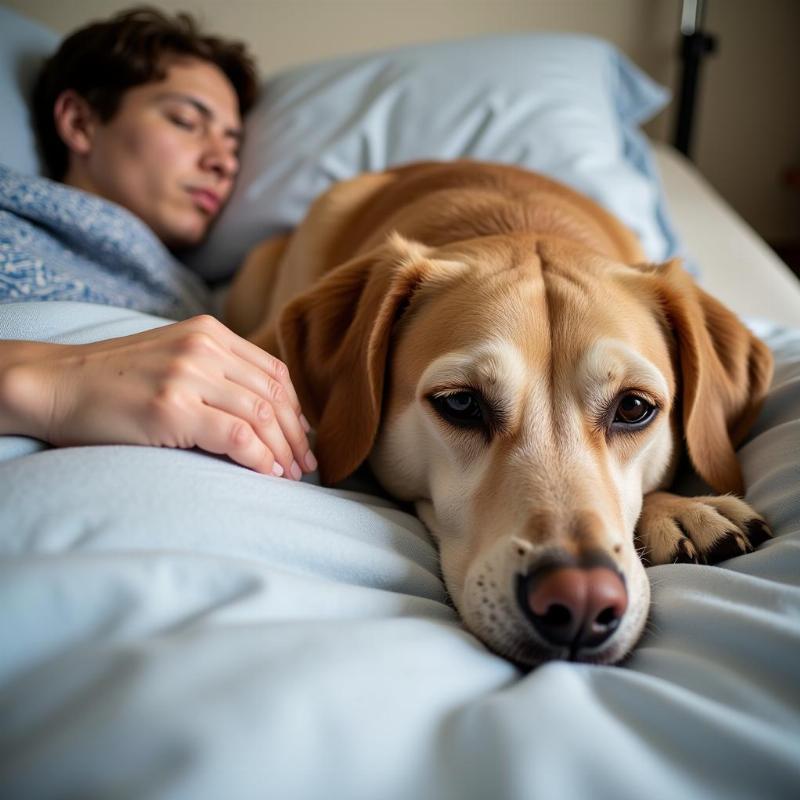The question of whether your dog can lick you while you’re undergoing chemotherapy is a common and important one. It’s natural to want the comfort and companionship of your furry friend during this challenging time, but your health is paramount. While the bond with your dog is undeniable, chemotherapy can weaken your immune system, making you more susceptible to infections. This article addresses the potential risks and provides guidelines for safe interactions with your dog during chemo.
Understanding the Risks of Dog Licks During Chemotherapy
Chemotherapy drugs work by targeting rapidly dividing cells, including cancer cells. However, they can also affect healthy cells, especially those in your bone marrow, which play a crucial role in your immune system. This weakened immunity makes you vulnerable to infections, even from sources that wouldn’t normally pose a threat. A dog’s mouth, while not inherently dirty, contains bacteria that could be harmful to a compromised immune system. Therefore, direct contact with your dog’s saliva, especially through licking, should be approached with caution.
Specific Concerns Related to Dog Saliva and Chemotherapy
Dog saliva contains a variety of bacteria, some of which can cause infections in humans. While these bacteria are typically harmless to healthy individuals, they can pose a significant risk to someone undergoing chemotherapy. Even minor infections can become serious complications when your immune system is suppressed. This is why it’s crucial to minimize your exposure to potential sources of infection, including your dog’s saliva.
Safe Interactions with Your Dog During Chemo
While minimizing direct contact with your dog’s saliva is important, it doesn’t mean you have to completely isolate yourself from your furry companion. There are ways to maintain a loving relationship with your dog while protecting your health. Here are some guidelines to follow:
- Handwashing: Wash your hands thoroughly with soap and water after any interaction with your dog, even if they haven’t licked you.
- Avoid Face Licking: Discourage your dog from licking your face, mouth, and any open wounds or cuts.
- Regular Bathing and Grooming: Keep your dog clean and groomed to minimize the amount of bacteria on their fur and skin.
- Environmental Cleaning: Regularly clean your home, especially areas where your dog spends a lot of time.
- Consult Your Oncologist: Discuss your specific situation with your oncologist. They can provide personalized advice based on your treatment and health status.
 Dog lying next to its owner who is undergoing cancer treatment
Dog lying next to its owner who is undergoing cancer treatment
Alternative Ways to Show Affection
You can still show your dog love and affection without putting your health at risk. Consider these alternatives to licking:
- Gentle petting
- Playing fetch or other games
- Cuddling with a blanket between you and your dog
- Talking to your dog in a soothing voice
Talking to Your Veterinarian
It’s also important to talk to your veterinarian about your dog’s health. They can advise you on any necessary precautions to ensure your dog remains healthy and doesn’t pose any additional risks to your weakened immune system. They can also offer guidance on how to manage your dog’s behavior and adapt to changes in your routine due to chemotherapy.
Conclusion
While the love and companionship of your dog can be incredibly valuable during chemotherapy, it’s essential to prioritize your health. By understanding the risks associated with dog licks and following the guidelines outlined above, you can maintain a close bond with your furry friend while minimizing your exposure to potential infections. Always consult with your oncologist and veterinarian for personalized advice tailored to your specific situation.
FAQ
-
Can my dog get sick from my chemotherapy drugs? Generally, casual contact with your dog won’t expose them to harmful levels of chemotherapy drugs. However, avoid letting your dog lick areas where you apply topical medications or where bodily fluids might be present.
-
What if my dog accidentally licks me while I’m on chemo? Wash the area thoroughly with soap and water. Contact your oncologist if you notice any signs of infection, such as redness, swelling, or pain.
-
Can I still walk my dog during chemo? Yes, you can usually still walk your dog, but avoid crowded dog parks or areas with a high concentration of animals.
-
Is it safe for my dog to sleep in my bed during chemo? While it’s generally safe, consider using a blanket as a barrier and discourage your dog from licking your face.
-
Should I rehome my dog during chemo? Rehoming your dog is generally not necessary. With proper precautions, you can safely enjoy their companionship during treatment.
Related Articles
- how long can a dog on chemo lick you
- can a dog on chemo lick you
- dog has diarrhea after surgery
- female dog vulvar tumor pictures
Beautdogs.us is your premier online resource for comprehensive dog care information, breed-specific advice, and product recommendations. We cater to both new and experienced dog owners, providing expert guidance on all aspects of dog ownership. From nutrition and grooming to training and health, Beautdogs.us empowers you to make informed decisions for your beloved companion. Learn more and explore our extensive library of resources at https://beautdogs.us. For personalized assistance, contact us at [email protected] or call us at +1 501-555-7529.